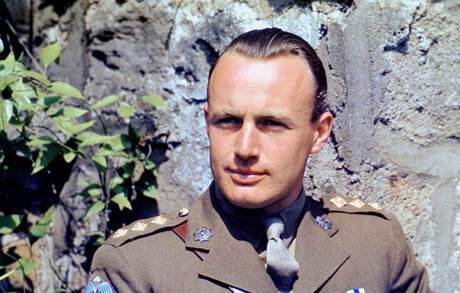On a recent long-haul flight, I watched a bloodthirsty action comedy set off the coast of West Africa during World War II. It wasnt my usual choice of viewing, but as the film was based (extremely loosely) on a real mission in which my uncle, Geoffrey Appleyard, took part, I was intrigued.
The Ministry of Ungentlemanly Warfare, directed by Guy Ritchie, draws its inspiration from Operation Postmaster, in which Geoffrey (played by Alex Pettyfer) and his fellow commandos stole an Italian and a German ship from harbour on the island of Fernando Po. The British feared that these ships were being used to supply the submarines which were attacking Allied shipping in the Atlantic. As Fernando Po was under Spanish rule, and Spain was neutral, any attack by the Allies risked escalating the war – so the operation was undercover and deniable by the British authorities.
As shown in the film, the ships were spirited away on the evening of 14 January 1942 while their officers were at a party on shore, with their table seating arranged with their backs to what was happening in the harbour. But unlike in the film, no one was killed. Those who boarded the ships were armed with coshes and, according to one of those who took part, only one person was struck.
The film is packed with fictions, including Geoffrey’s imprisonment and torture and his liberation in a scene of gleeful carnage. As a Daily Mail reviewer commented, the film applies its "director’s fondness for swaggering, exploitation-style ultraviolence… to a real-life stealth mission which would have been thrilling enough if it had been told with a little historical accuracy".
My mother, Margot Lean, brought me up on stories of her brother Geoffrey, who was lost in action nine years before I was born. He was a passionate birdwatcher – he and his brother knew the nesting sites and family histories of every dipper in Upper Wharfedale, Yorkshire – and sportsman. Had it not been for the war, he would have skied in the Olympics, as his younger brother, Ian, later did. As it was, he ski-ed for his country in Norway and Switzerland, and I have one of the cups to prove it.
She was justly proud of his daring exploits as a commando during World War II, for which he was awarded the Military Cross and Bar and the Distinguished Service Order. When he went to receive the latter – his third medal in 11 months – King George VI said, "What, you here again?"
Since the declassification of documents relating to Operation Postmaster in 2016, a number of books have appeared about Geoffrey and his fellow commandos, and claims have been made that he was one of Ian Fleming’s inspirations for James Bond. But there is a part of the story which is less well-known.
As a student at Oxford in the early 1930s, my mother had thrown in her lot with the Oxford Group (later Moral Re-Armament and now Initiatives of Change). Early in the war, Geoffrey returned home on leave from France and told her that he wished he could help the troops under him with their personal problems. She suggested to him that he could help them to find a faith in God. "I can’t give them what I haven’t got," he replied. As told in my father’s book, Good God it Works!, this was a turning point.
Geoffrey, a memoir written by my grandfather, quotes a letter from Geoffrey: "The day I left home… I made the great decision… of giving my life to Christ. I haven’t necessarily joined the Oxford Group although I believe that in time this will mean full identification with them. But I have decided that I have tried running my own life on my own principles and standards long enough, and not made a very startling success of it. So now I am going to run my life on God’s standards… and so try and do my bit in the remaking and moral re-armament of the world."
"From this time on," his father wrote, "Geoffrey relied greatly on God’s guidance and help."
One example took place during the retreat to Dunkirk, after Germany’s invasion of France in May 1940. Geoffrey had been sent to meet 10 lorries at a bridge and lead them to Dunkirk, but when he reached the bridge, it was under heavy fire and only eight lorries had arrived. He sent them on ahead and agonised over whether to wait for the other two. Then he had an insistent thought: "Follow those eight lorries at once."
He caught up with them in time to redirect them before they headed straight into the enemy lines. The bridge was blown up half an hour after he left it, and he later discovered that missing lorries had been diverted by other orders. He believed that God had sent him that thought.
Waiting for evacuation in the sand dunes as Dunkirk, as the bombs fell around him, Geoffrey hear a voice in his ear, "I say, I feel like a bloody coward, how about you?" The speaker, Gus March-Phillipps, was to become his friend and his commanding officer.
When they got back to Britain they hatched the idea of creating a small mobile raiding force. After Operation Postmaster, they focused on raids on the coast of occupied France, forcing the Germans to divert troops to coastal defences. Gus was killed during one of these raids in September 1942. Geoffrey went missing in July 1943, during the Allied invasion of Sicily, aged 26. My mother once told me that she used to hope that she would run into him in the street and find he had survived.
Another heroic figure from World War II, Vladimir "Popski" Peniakoff, said of Geoffrey, "The care he took of his men made him stand out among brother officers who were too excited by the prospect of adventure to think of anybody but their own selves."


